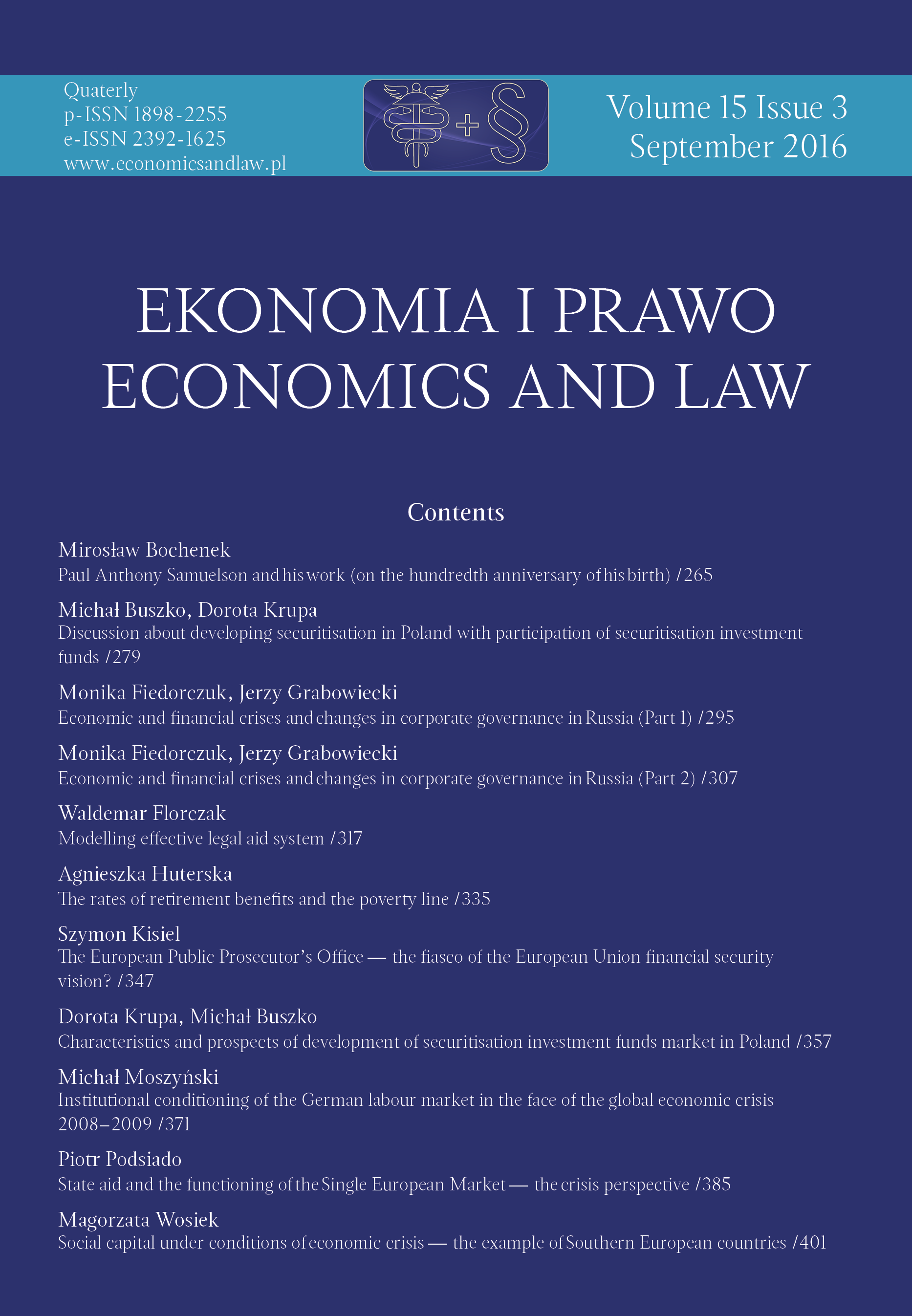Social capital under conditions of economic crisis — the example of Southern European countries
DOI:
https://doi.org/10.12775/EiP.2016.027Keywords
social capital, economic crisis, Southern European countriesAbstract
Aim: Deliberations of the article revolve around trends of social capital under conditions of economic crisis.
Motivation: Final conclusions are based on theoretical considerations and empirical research. The latter include analysis of changes in indicators of social capital (in the cognitive, structural and behavioural dimension) in Southern European countries (Spain, Greece and Portugal) — from comparative perspective — before and after 2007. Data from European Social Survey and European Value Study were used. The example of Southern European countries shows that there can be no universal reaction scheme (in terms of social capital) on the crisis phenomena.
Results: A common feature of the analyzed countries after 2007 is an increase in ties with friends (bonding social capital, however the heightened importance may not just be a consequence of the crisis, but rather part of long-term societal change — e.g. Portugal) and a reduction in institutional and systemic trust. It can be also concluded that countries well endowed in social capital (e.g. Spain), in the period of economic crisis to the greater extent employ social capital resources as a response to non-beneficial changes in the economic environment (which is illustrated by higher rates of civic and political participation).
References
Coleman, J.S. (1990). Foundations of Social Theory, Cambridge: Harvard University Press.
European Commission. (2014). Public Opinion in the European Union. First results, doi:10.2775/68303.
European Social Studies Data. (2016). Retrieved 30.12.2016 from http://nesstar.ess.nsd.uib.no.
European Values Study. (2016). Retrieved 30.12.2016 from http://www.europeanvaluesstudy.eu.
Fischer, J.A.V., & Torgler, B. (2006). The Effect of Relative Income Position on Social Capital. Economics Bulletin, 26(4).
Fiszbel, A., Giovagnoli, P., & Aduriz, I. (2003). The Argentine crisis and its impact on household welfare, CEPAL Review, 79.
Frankenberg, E., Duncan, T., & Beegle, K. (1999). The real costs of Indonesian’s economic crisis: preliminary findings from the Indonesian family life surveys. Labour an Population Program Working Paper Series, 99-04.
Fukuyama, F. (2000). Wielki wstrząs. Natura ludzka a odbudowa porządku społecznego. Warszawa: Politeja.
Grootaert, C., & van Bastelaer, T. (Ed.). (2002). Understanding and Measuring of Social Capital. A Multidisciplinary Tool for Practitioners. doi:10.1596/0-8213-5068-4.
Growiec, K., Vilhelmsdóttir, S., & Cairns, D. (2012). Social Capital and Financial Crisis: The Case of Iceland. CISE e-Working Papers, 138.
Kostro, K. (2005). Kapitał społeczny w teorii ekonomicznej. Gospodarka Narodowa, 7–8.
Matysiak, A. (2005). Reprodukcja kapitału społecznego w gospodarce. Zeszyty Naukowe Akademii Ekonomicznej w Poznaniu, 58.
Milewski, R. (Ed.). (2002). Podstawy ekonomii. Warszawa: PWN.
Moser, C. (1996). Confronting crisis: a comparative study of household responses to poverty and vulnerability in four poor urban communities. Environmentally sustainable development studies and monographs series, No 8, Washington: World Bank.
Parts, E. (2013). The dynamics and determinants of social capital in the European Union and Neighbouring Countries. Discussions on Estonian economic policy: Theory and practice of economic policy in the European Union, 1. doi:10.2139/ssrn.2336016.
Putnam, R.D. (1995a), Turning in, turning out: the strange disappearance of social capital in America. Political Science and Politics, 28(04). doi:10.1017/s1049096500058856.
Putnam, R.D. (1995b). Demokracja w działaniu społecznym. Kraków: Znak.
Rothstein, B., & Stolle D. (2002). How Political Institutions Create and Destroy Social Capital: an Institutional Theory of Generalized Trust. Paper presented at the annual meeting of the American Political Science Association, Boston, Massachusetts, August 28, 2002.
Rothstein, B., & Stolle, D. (2003). Social Capital, Impartiality, and the Welfare State: An Institutional Approach. In M. Hooghe, & D. Stolle (Eds.), Generating Social Capital. Civil Society and Institutions in Comparative Perspective. New York and Houndmills, Basingstoke: Palgrave Macmillan.
Sztompka, P. (2007). Zaufanie. Fundament społeczeństwa. Kraków: Znak.
Tonkiss, F. (2009). Trust, Confidence and Economic Crisis. Intereconomics, 44(4). doi:10.1007/s10272-009-0295-x.
Wong, S. (2013). From economic meltdown to social crunch: Lesson about social capital and economic crises. Procedia — Social and Behavioral Sciences, 72. doi:10.1016/j.sbspro.2013.02.009.
Downloads
Published
How to Cite
Issue
Section
Stats
Number of views and downloads: 778
Number of citations: 0
